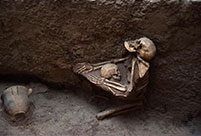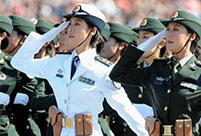

Japanese prime minister under pressure to express remorse for past aggression
Sources close to Japanese Prime Minister Shinzo Abe said on Monday that the Japanese leader's statement on Friday will include key words such as "apology", and observers said Abe is possibly doing so because of pressures both internally and externally.
Japan's public broadcaster NHK quoted unnamed sources close to the government as saying that the draft of the Abe statement-to be issued one day before the 70th anniversary of the end of World War II-will include the key words "apology" and "aggression" in addition to the phrases "deep remorse" and "colonial rule".
The four essential words and phrases appeared in a landmark statement in 1995 by then prime minister Tomiichi Murayama in expressing remorse for Japan's wartime atrocities.
Abe will talk about historical facts of the war, Japan's Kyodo News agency quoted unnamed government sources as saying on Monday.
Japan's Chief Cabinet Secretary Yoshihide Suga said that Japan will try to issue English, Chinese and Korean versions of Abe's statement. Suga said the exact wording of the Aug 14statement is up to the prime minister.
Park Geun-hye, president of South Korea, asked on Monday for Abe to clearly uphold the historical perspective of past Japanese governments in his statement.
Li Wei, director of the Institute of Japan Studies at the Chinese Academy of Social Sciences, said that the Abe Cabinet "for quite a long time has been testing and probing to see reactions from back home and from abroad".
"Monday's development indicates that Abe probably knows that now he has to put those key words into the statement," Li said.
Japan's right-leaning newspaper Sankei Shimbun said Abe was likely to use the word "aggression", though not necessarily linking it to Japan's wrongdoings.
The Cabinet also faces record low support, which has put huge pressure on Abe, Li said.
The latest survey by leading Japanese television network NTV from Aug 7 to Aug 9 found that the approval rating for the Abe administration has sunk to 37.8 percent, the lowest since the second Abe Cabinet was inaugurated in December 2012.
The South Korean Foreign Ministry called on Monday for Japan to "clearly" inherit the spirit of three key apologies for wartime wrongdoings by past administrations-the 1993 Kono, 1995 Murayama and 2005 Koizumi statements, Yonhap news agency reported.
"We hope that Seoul-Tokyo ties will develop a virtuous circle and Japan could become a responsible member of the global community," said ministry spokesman Noh Kwang-il.
Wang Xinsheng, a professor of Japanese studies at Peking University in Beijing, said that the Cabinet is trying to "create a reconciliatory atmosphere in which Tokyo's ties with Beijing and Seoul are not that tense", and that the pressure from within the ruling coalition is also quite strong.
"Abe's current top priority is to make sure the radical security bills get passed in the upper house, and he can afford to make a concession on the statement to satisfy the pacifists," Wang said.
 Shocking scenes found in 4000-year-old earthquake relic
Shocking scenes found in 4000-year-old earthquake relic Female soldiers add color to military parades
Female soldiers add color to military parades Taiwan campus belle with gorgeous look
Taiwan campus belle with gorgeous look  Stunning photos of China’s fighters and airborne troops
Stunning photos of China’s fighters and airborne troops Mums stage breastfeeding flash mob
Mums stage breastfeeding flash mob PLA South China Sea Fleet conducts live fire exercise
PLA South China Sea Fleet conducts live fire exercise Beauty of Tsinghua University transforms into car model
Beauty of Tsinghua University transforms into car model Official shot having sex with two college girls
Official shot having sex with two college girls Moscow “spider-man” climbs Chinese skyscraper
Moscow “spider-man” climbs Chinese skyscraper Fiery freezer
Fiery freezer Bearly getting along
Bearly getting along Top luxury firms struggling in China
Top luxury firms struggling in China Japan reads too much into WWII parade
Japan reads too much into WWII paradeDay|Week